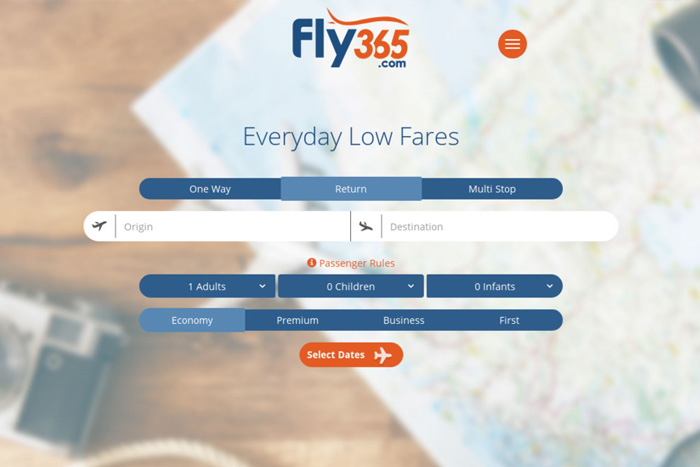The shock collapse of Australian online travel agency Fly365.com in recent weeks has raised many questions for the industry, provoking a wide range of reactions from travelBulletin readers, both positive and negative.
On the one hand, the business model of Fly365.com appears to have been similar to several other OTAs which rely for their marketing solely on meta-search sites like Skyscanner and Kayak, where in order to get the booking you have to be the cheapest. That race to the bottom inevitably leads to lower margins, with previous experience indicating sometimes tickets are sold at a loss in the hope of making up the difference from GDS segment rebates and by achieving override targets. It’s hard to keep a business running when you buy something for a dollar and sell it for 99c, as some of these companies have found to their misfortune.
“Thanks goodness, another one of those bottom-feeding OTAs has gone under – that will teach the people who book online rather than through a travel agent just so they can save themselves $15,” was a typical comment on our Facebook page after we broke the news late on a Friday afternoon in February.
However the other side of the coin is that Fly365.com was part of the AFTA Travel Accreditation Scheme, which by all appearances was blindsided when directors Scott Mayne and Mustafa Filizkok appointed Nicarson Natkunarajah from Sydney-based Rogers & Carson as Voluntary Administrator.
Again the reaction from our readers was savage. “How could AFTA let this happen? Bring back the TCF!” came the cries, along with the predictable “this wouldn’t have happened in the old days…”

The shutdown of Fly365 was curiously reminiscent of the Bestjet collapse just over 12 months earlier – and no wonder, because Fly365 chief Scott Mayne was previously GM of Bestjet prior to founding his own operation.
The truth of the matter is yet to be revealed, but early indications are that there may have been some significant irregularities in the way Fly365 operated, particularly in its final weeks and months.
In the wake of the collapse, AFTA CEO Jayson Westbury said the Federation “strongly believes that contributing circumstances beyond the control of AFTA and the ATAS scheme have resulted in this outcome. AFTA does all that it can to monitor and review travel businesses who hold ATAS accreditation, and for the most part this has enabled AFTA to predict certain outcomes.
“Unfortunately, AFTA was not in a position to either provide advance support to the business prior to its failure or predict this outcome,” Westbury said.
“While the liquidation process will need to run its course, a much deeper review of the situation is being undertaken by AFTA and a further review of the ATAS scheme will be given serious consideration as it applies to Online Travel Agents in Australia,” he added.
Despite heavy media coverage of the collapse showing broken-hearted travellers lamenting their losses, the reality is that almost all of the consumer losses will be covered by credit card chargebacks. A hastily-convened Facebook action group quickly gathered over 3,000 members whose initial stories of outrage have since been superseded by exclamations of delight as they received their money back. By their very nature, OTAs like Fly365 only take bookings via credit card, and in this case the chargeback provisions of the Australian Consumer Law appear to have worked well. Moreover by all accounts it appears airlines have also bent over backwards to assist affected people, in many cases offering them the opportunity to rebook at similar prices.
The exceptions, of course, are customers who cancelled flights prior to the collapse and were given “vouchers” for future travel by Fly365, which are of course now worthless. And the situation has been complicated further by the rise of coronavirus, which has seen many flight cancellations both on the airline side and also on the part of customers who are now reticent to travel. A tangled web indeed, so it’s no wonder that the administrator quickly acted to engage additional help from Veritas Advisory.

Fly365’s business model also involved the use of consolidators, and from the initial creditor’s list it appears Helloworld’s Air Tickets was caught holding the can – to the tune of about $3.1 million. Other creditors include Skyscanner and Kayak, both owed a couple of hundred thousand dollars. Initially Express Travel Group also appeared on the creditor’s list, owed about $100,000. However CEO Tom Manwaring later confirmed that this was incorrect, telling travelBulletin that ETG did not have any outstanding debt from the collapse.
Although the Administrator’s investigations are still ongoing at this stage, evidence appears to be mounting of very unusual behaviour by Fly365 in the lead-up to it being placed into administration.
It appears that the first indications of problems may have been flagged by consolidators, who noticed the OTA was making many reservations that were not being paid. In fact one member of the Facebook group said he had been told by the Administrator that no bookings had actually been ticketed since the start of 2020 – which would mean that Fly365 had simply been taking customer’s money but not actually passing it onto airlines.
There’s also a clear indication that the OTA was in some cases making the most of more expensive “Y” class fare rules, which allow bookings to be held for up to a month without payment. That meant Fly365 customers would receive a booking confirmation, which they could check on an airline’s website and make seat reservations, purchase ancillaries and so on – without the booking actually being paid. This strange behaviour was documented by a travel agent caught up in the collapse, who ruefully admitted she had booked with Fly365 because the prices just seemed to good to be true – an accurate prediction as it turned out.
She noticed that her booking, which had been made in relation to a heavily discounted fare to India, was actually in the higher, more flexible but also more costly Y class, raising the question that this type of activity by Fly365 was at best completely uncommercial, and at the worst downright deceptive – allegedly.
Another curiosity was the formal statement of assets and liabilities lodged with the Australian Securities and Investments Commission by Fly365 director Scott Mayne, in which he claimed the company owned nothing except a bank account, and estimated that its total debts amounted to nothing.
As AFTA has reiterated in its recent marketing campaign, it is not to blame for the demise of any companies which collapse. “Poor financial management is the only cause of a company becoming insolvent,” the Federation stressed, promising to seek new solutions this year to “provide all involved with confidence in the travel value chain and make the payment eco-system in the Australian travel industry more robust”.






